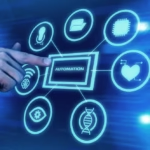“Right now, we are on the verge of transformations that will change not only business and governments but also our everyday lives. Artificial intelligence, digital education, ethical technology — these areas are no longer futurism but a practical necessity.” — Bill Gates.
We have prepared a detailed overview of Bill Gates’ key ideas, which he has voiced in numerous blogs, in-depth interviews, and during public appearances in recent years. The thoughts of one of the most influential innovators of our time reveal not just a technical vision of the IT future but also offer a detailed action plan for anyone who strives to build a more just and efficient society with technology as a fundamental driver of progress.
Gates’ statements reflect his comprehensive approach to solving global problems through the lens of technological innovation. Each concept proposed by the Microsoft co-founder forms part of a holistic philosophy that combines technological progress with humanistic values. Analyzing his ideas allows us to identify strategic directions for business, governments, and civil society development.
Gates’ views on the future of technology are distinguished by extraordinary foresight and a comprehensive understanding of the relationship between digital innovations and social transformations. His vision extends far beyond traditional corporate strategies, encompassing issues of global inequality, healthcare, education, and sustainable development. Through his public speeches and charitable activities of the Bill & Melinda Gates Foundation, he offers concrete mechanisms for using technological potential to solve humanity’s most pressing problems.
The views we have collected represent methodical recommendations for leaders in various fields, including technology entrepreneurs, politicians, educators, and civic activists. The methodology proposed by Gates is based on data analysis, an interdisciplinary approach, and long-term strategic planning. His advice covers a wide range of practical aspects: from developing innovative products to creating fair models for distributing technological benefits.
A distinctive feature of Gates’ philosophy is his emphasis on the responsibility of technology companies to society. He consistently advocates the idea that profit cannot be the only criterion of success in the era of digital transformations. According to his vision, true progress is measured by the ability of technological innovations to improve people’s lives in all corners of the planet, especially the most vulnerable segments of the population.
The ideas presented form a comprehensive roadmap for those who seek to use technology as a catalyst for positive social change. Gates’ vision offers a balanced approach that takes into account both economic realities and ethical aspects of technological development, creating a foundation for building a more just and prosperous world of the future.
Education: “AI will change teaching within a few years”
“Within 5 years, artificial intelligence will be able to teach a child to read and write. This won’t replace teachers but will become an invaluable support tool.” — Bill Gates, translated from Gates Notes
Gates emphasizes that access to quality education is the main point of equality in the 21st century. In his speeches, he often returns to the theme of “learning without borders”: AI-based platforms, personalized learning, interactive feedback.
Example: in his work with Khan Academy, he supports the implementation of Copilot-like solutions that help students master complex topics at an individual level, regardless of country or school.
Technology: “We are responsible for the consequences of the software we create”
“Technology without ethics is like a car without brakes.” — from his speech at Goalkeepers 2023
Gates acknowledges that software development must have clear boundaries. Algorithm transparency, bias in AI, data security — these topics appear in almost every public statement he makes.
He calls for creating an ethical code for developers and legally regulating the use of AI, especially in healthcare, education, and social media. According to him, engineers should be responsible not only for the functionality of a product but also for its social consequences.
Philanthropy: “Equal access to digital services is the foundation for change”
“When we give people access to tools, we are actually opening doors to opportunities for them.” — Gates Foundation Annual Letter
Gates Foundation initiatives are not just about vaccines and fighting poverty. Over the past 5 years, the foundation has funded dozens of digital initiatives: electronic outreach platforms, mobile health services, online tools for educational programs in Africa and South Asia.
Bill Gates is convinced: combining technology and philanthropy is the only path to systemic change. And those who are developing Civic Tech, EdTech, or Digital Inclusion today are like-minded individuals.
What does this mean for civic initiatives?
This approach is a powerful reminder for organizations working at the intersection of social impact and technology:
- NGOs have the right (and duty) to utilize AI if they want to scale their initiatives.
- Technology partners must care not only about functionality but also about the ethics of solutions.
- Philanthropists should invest in digital tools, just as they do in basic medicine or education.
Lessons from Bill Gates: Don’t just inspire — act
Bill Gates is a well-known figure in the technology world, and also an example of a person who combines deep knowledge, large-scale influence, and genuine social responsibility. His approach includes patronage and innovation for society. It’s systemic thinking about how to make the world more just through technology.
The main lesson from Gates for each of us:
Create solutions not just for the market, but for society. Your development, service, educational course is more than a product. It’s a tool for change. And the broader you look at its impact, the more good you can do.
For non-governmental organizations, this means:
- Using the latest technologies to reach more people, help more effectively, ensure transparency and trust in their work.
- Not being afraid to experiment with AI, CRM, cloud platforms — these tools are accessible and are already helping others.
For municipalities:
- Engaging Civic Tech to improve communication with citizens, optimize services, increase transparency.
- Studying examples of successful initiatives — from electronic budgets to mobile services for citizens.
For socially responsible businesses:
- Viewing your IT solutions not only as a competitive advantage but also as a platform for social impact.
- Investing in projects that change the lives of communities, expand access to education, improve healthcare, or enhance digital literacy.
Gates shows that technology is not an end in itself, but a tool for building a more just world. His own experience — from creating Microsoft to supporting global initiatives — proves that innovations, backed by ethics and vision, change the lives of millions.
And today, when digital transformation encompasses all areas — from education to healthcare — each of us has the opportunity to become an agent of these changes. To open new possibilities for our community, to make technology more accessible to the people who need it most.
Act today. Experiment, learn, implement, and create changes that matter.








